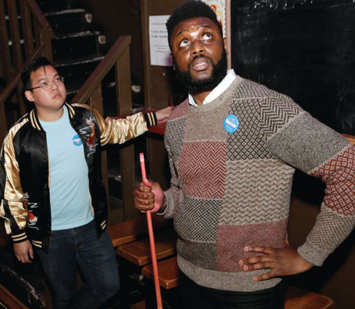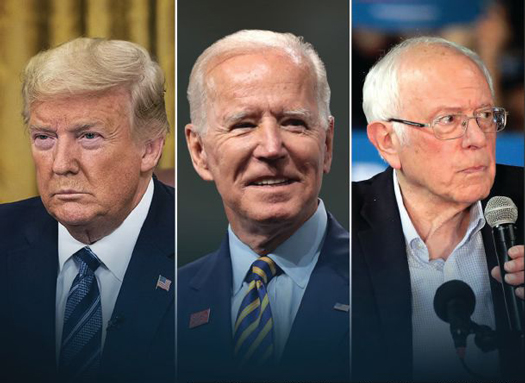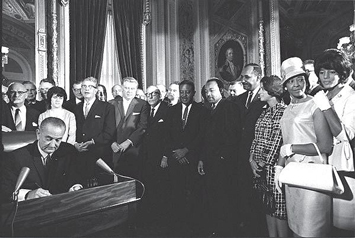The pursuit of real Black political power in 2020
By Starla Muhammad -Managing Editor- | Last updated: Mar 18, 2020 - 3:24:15 PMWhat's your opinion on this article?
‘Power concedes nothing without a demand. It never did and it never will.

Find out just what any people will quietly submit to and you have found out the exact measure of injustice and wrong which will be imposed upon them, and these will continue till they are resisted with either words or blows, or with both.
The limits of tyrants are prescribed by the endurance of those whom they oppress.’
—Frederick Douglass
The political power wielded by America’s Black voters, record numbers of Black elected officials, the growing platform of Black political operatives and influencers is a potent combination that could be an instrumental force in placing Black issues at the forefront of the Democratic Party platform.
The impact of the Black vote is undeniable. Former Vice-President Joe Biden garnered 61 percent of the Black vote compared to 17 percent for Senator Bernie Sanders in the South Carolina primary. Late last year, a Hill-HarrisX poll revealed that 85 percent of Black voters would choose any Democratic candidate over President Donald Trump. “Ninety-eight percent of Black voters who identify as Democrat, and 72 percent of those who identify as independent said they would back whoever ultimately becomes the Democratic nominee over Trump. Just 12 percent of Black voters who identify as Republican said the same,” noted thehill.com. In the 2018 mid-terms Blacks voted overwhelmingly (90 percent) for the Democratic candidate, including comparable shares of Black men (88 percent) and Black women (92 percent), noted Pew Research.
Every presidential and mid-term election cycle Black voters are wooed and courted by moderate and progressive candidates. And in key races, when Black voters “show up and show out” they are lauded and applauded as political “saviours” and propped up as the “backbone” of the party. Yet, many Blacks are left with the same questions year after year, election after election once candidates they voted for take office: What is your Black Agenda and what are your concrete plans to address our community needs?
Now that the Democratic primary race is down to Mr. Biden and Sen. Sanders, heated debates, arguments and discussions abound about which elderly, White, career politician Blacks should support and why. But more importantly, analysts point out, what are Black people willing to demand from both men in exchange for their vote and are Blacks willing to hold them accountable?
“We are waiting on White candidates to present a Black agenda,” explained Maze Jackson, a host of the morning show on 1690 WVON-AM, Chicago’s Black talk radio station, chief strategist of The Intelligence Group and known for his frequent tagline, “What’s in it for the Black People?”
Erasing a slave mentality
Black people have a tendency to vote on emotion, who makes us feel good or who we like but with no tangible outcomes, explained Mr. Jackson.
“In my estimation we have it wrong anyway. In our communities, we look at politicians as a form of royalty. In White communities, they look at politicians as community servants. So essentially, what happens is, we wait for a movie to come out or something that gets us fired up about something in the candidate’s past and then we say, well, that’s the reason we’re not gonna vote for them,” said Mr. Jackson, former executive director of the Illinois Legislative Black Caucus.
“Like for Joe Biden it’s the crime bill, right? But essentially, that’s not what we should be voting on. What we should be doing is identifying our issues, problems and concerns. I would say a 10-point Black Agenda seems aggressive, but at least a three-point agenda in which we can say that we want the candidates to commit to doing these things. And by committing to do these things, you are now eligible for us to vote for you. Well, we haven’t even put anything on the table and so essentially, they’re left to their own devices, which is why they come up with Gay, Trans and all of that stuff; Black Transwomen as a top priority, because they are really listening to an echo chamber that is put together by the White folks that they know,” said Mr. Jackson.

Left to Right: Donald Trump, Joe Biden, Bernie Sanders
‘Blacks often wait for the dominant party to “select” someone for us to vote for and support ... Then we argue amongst each other whether or not we should support this or that candidate and we’re seeing that played out over again right now. Do we support Sanders, do we cave in and go for Biden? What that does is, it encourages an undue singular focus on the presidential race. It discourages us from realizing all the different ways that electoral politics can be made to work for us.’ |
Blacks in America have a very unique history as a people, explained Student Minister Dr. Ava Muhammad. There has never been a people who were under the rule of another people and in the case of Black people in America—outright enslaved—where the chattel slavery ended as a result of a war (the Civil War) and subsequently stayed in the land of their oppression and captors.
“We remained here and have tried to assimilate into that society and its economic and political structure and that’s just not possible because the structure of America is on a foundation of the enslavement of Black people. And it’s on a foundation that remains on a doctrine of White supremacy,” said Student Min. Muhammad, national spokesperson for the Honorable Minister Louis Farrakhan and the Nation of Islam.
“People have undergone far less trauma as a nation and have not advanced as quickly as we have. But I think our problem is that because we have that slave master/slave relationship. The essential relationship of slave master/slave has remained. Now as a result of that the slave looks to the slave masters’ beneficence and prays for that. As a slave you don’t initiate ideas. You just pray that your owner or your superior will do right by you. And that has remained our group mentality,” she pointed out.
“It doesn’t take all of us. We have to come out of this myth that we all have to agree to something. We (Black people) have a demographic also. There’s a significant number of Black people who want the issue of reparations addressed and there are enough of us to coalesce and say out in the public: ‘look, we want the presidential candidate to explain what your position is on reparations before we vote for you. And then we’re going to discuss that in our community among ourselves. And we don’t want anything generic,’ ” said Student Min. Muhammad, an accomplished author and radio host. “We want your specific plan on how to bring an end to the treatment of 40 to 60 million Black people that is robbing us of a quality of life. We’re all in colonies called ghettos. We have been locked out of any legitimate path really to economic self-sufficiency, everything from credit scores, to closing our schools to systematically keeping us out of certain fields and industries to shipping all the manufacturing jobs out of the country. We didn’t have any voice in that and that’s what helped make us a middle class, manufacturing and government jobs. We need to know what your plan is for this very significant percentage of the U.S. population,” she emphatically stated.
While it is true that Blacks aren’t a monolith and are not single-issue voters, there are certain concrete substantive issues that have yet to be honestly and effectively addressed in the over 400 years since enslaved Africans and their descendants have been in a country they contributed to, built and helped develop into a global super power. In December of last year, the Joint Center for Political and Economic Studies and Third Way released findings from a survey of 1,200 African Americans across the nation to highlight attitudes, priorities, and values of Blacks as the 2020 race approaches. And while priorities depended on age, geographic location, education and other factors, many of the issues of those surveyed were similar. When asked about issues the federal government could address that would personally benefit their lives, the survey found that Black people across America prioritize kitchen-table economic priorities and urgent challenges threatening their neighborhoods, noted the study titled, “A Nuanced Picture of What Black Americans Want in 2020.”
Some of these economic issues included: affordable housing, lower health care costs, improving water and air quality, reducing racism, fighting income inequity and making college more affordable. One important observation the study noted was that Blacks “are in sync with the activist Democratic base on some core values while quite divergent on others.”
Dr. Greg Carr is associate professor of Africana Studies and Chair of the Department of Afro-American Studies at Howard University and adjunct faculty at the Howard School of Law. He said it would be ideal for Blacks to have a consensus Black agenda. “If looking over the arch of our history in this country is any indication it seems that the farther we get away from enslavement the more difficult such consensus becomes,” he explained. That is primarily because slavery was a common foe so even within small groups of the “Black Elite” such as Richard Allen and later on the Negro Convention movements in the 1850s and 60s there were only a tiny group of Africans who were not “under the lash every day,” he told The Final Call. Mr. Allen was born into slavery in 1760, purchased his freedom and later founded the African Methodist Episcopal Church, in 1816.

President Lyndon B. Johnson signs the Voting Rights Act of 1965 with Martin Luther King Jr. and other civil rights leaders in attendance.
|
After the Civil War, during Reconstruction and afterward there was another common foe: ending Jim Crow and racial violence and terror against Black folks. The NAACP, Garvey Movement, Moorish Science Temple and Nation of Islam had different methodologies and political perspectives for addressing these issues but again, there was a commonality, explained Dr. Carr.
“But we all agreed that this White supremacist, White rule must end. So we had some consensus and then after we smashed Jim Crow and the laws began to change a little because of our collective efforts,” said Dr. Carr.
He said the last time there was some consensus and work toward a Black political agenda was the 1972 Black Political Convention in Gary, Indiana, in the aftermath of the election of Mayor Richard Hatcher in that city and Mayor Coleman Young in Cleveland. Both men were the first Blacks elected as mayors of major U.S. cities. What made that gathering so powerful is because that was a moment when Black elected officials, Black nationalists, civil rights leaders, the Nation of Islam and various ideological segments of the Black community came together.
“Everybody was in the same room and at key moments it looked like the thing might fall apart but somehow we held it together … that was really the last time we had a common Black agenda,” said Dr. Carr. Out of that movement produced the 1984 and ‘88 presidential campaigns of Rev. Jesse Jackson.
“Fast forward to today. The kind of class-cleavages that happen in society, but that had not developed in Black communities because we had enslavement then we had Jim Crow that kind of forestalled this kind of class division, division by social class. Well, now, we have those things just like other communities. So there is a developed, kind of—I use the word elite or bourgeoisie or petty bourgeoisie. They look at the Black interests more closely aligned with their class position,” he continued.
Career politicians, people who work in government and the private sector, are looking at what they think is best for Black people from the perspective of a kind of naked capitalism and integrationist perspective, explained Dr. Carr. “Then you still got the nationalist people like us, the Pan-Africanists. But there’s no common enemy, like there was with enslavement and Jim Crow. So we have Black people at each other’s throat over really political positions that are really White people’s. And so there really isn’t a common Black agenda in part because some of the people who call it a Black agenda are really saying it’s a White agenda that we’re trying to grant ourselves into.
How to forge a Black agenda
Dr. Jared Ball agrees this fracturing of the Black community, makes coalescing on a common agenda challenging. “We are not enough organized as a community and that’s an ongoing continuous problem. We haven’t fully developed or expanded the Black united front. We haven’t developed any number of other formations that would more unify and coalesce us politically and that’s a problem,” said Dr. Ball, associate professor of multiplatform production at Morgan State University in Baltimore.
Dr. Ball told The Final Call that what he sees is another clear sign that Blacks have yet to develop upon the tactics or the strategic strategies, of great luminaries like Malcolm X and others as it relates to electoral politics.
“We should be coming to the table with an established agenda, platform, but more specifically, what I think we should be doing are running more of our own candidates in all manner of local, state and national elections,” said Dr. Ball.
“I’m flexible at this point how we want to do it, whether it’s within the Democratic party or as an alternative party, or whatever people want to do, but running our own candidates with our own platforms with our own agendas, where we know who those candidates are, we know their backgrounds, we know they’re going to stand strong on the platforms that we’re running them on. And that is really the only way I think we can and should engage electoral politics at this point,” he argued.
Blacks often wait for the dominant party to “select” someone for us to vote for and support, said Dr. Ball. “Then we argue amongst each other whether or not we should support this or that candidate and we’re seeing that played out over again right now. Do we support Sanders, do we cave in and go for Biden? What that does is, it encourages an undue singular focus on the presidential race. It discourages us from realizing all the different ways that electoral politics can be made to work for us.” Focusing on local, state and congressional races is just as important, he suggested.
Mr. Jackson explained essentially every campaign is supposed to have a policy team and that team is supposed to identify all the issues that would be an issue for the campaign for each individual constituency group (Blacks, Latinos, LBGTQ, etc.). But he pointed out, oftentimes there are no Blacks on the policy team. “Black people are usually relegated to the field team or the political team on a campaign. So, when a candidate is developing his platforms, etc., usually it’s based on something that they’re hearing, or the buzz or the groundswell. They really don’t do market research to find out things that are impacting Black folks,” explained Mr. Jackson.
Mr. Jackson recommends the convening of a Black Think Tank of top Black scholars around the country and out of that convening should emerge a 10-point plan that is presented to Black people, that addresses Black communities on multiple levels including business, politics, civic, education, and spiritual. That plan or agenda should then be presented to all candidates not just presidential candidates.
“They then have to tell us, ‘I agree with this or I will support this. I will support these things’ whether it’s reparations, whatever it is that the scholars come up with. When people then say yes, they commit, then they are eligible to be able to go after the Black vote,” said Mr. Jackson.
“We got this thing already in reverse,” he added.
Student Min. Muhammad agrees. “We need to create a coalition, the lowest common denominator. What is it as a people that we can agree on? Certainly, regardless of ideology or theology, we can agree that Black people are at the bottom rung of the economic ladder. And just like you’re getting ready to do an economic stimulus package, because of this Coronavirus, and you’re going to start giving money out to businesses, White businesses, right? Because they have suffered setbacks, you can do whatever you want to do. So, where’s the economic stimulus packages for the Black community and set aside all that red tape that as soon as you come up with a program, you come up with qualifications that eliminate us, deciding these credit scores, deciding what schools to stay open and what schools close,” she said.
“There are common issues that the whole spectrum of Black people should be able to centralize ourselves around,” said Student Min. Muhammad.
“That, to me is the approach. We need to recognize our own power. We’ve got to come out of a slave mentality.”
INSIDE STORIES AND REVIEWS
-
-
About Harriett ... and the Negro Hollywood Road Show
By Rabiah Muhammad, Guest Columnist » Full Story -
Skepticism greets Jay-Z, NFL talk of inspiring change
By Bryan 18X Crawford and Richard B. Muhammad The Final Call Newspaper @TheFinalCall » Full Story -
The painful problem of Black girls and suicide
By Charlene Muhammad -National Correspondent- » Full Story -
Exploitation of Innocence - Report: Perceptions, policies hurting Black girls
By Charlene Muhammad -National Correspondent- » Full Story -
Big Ballin: Big ideas fuel a father’s Big Baller Brand and brash business sense
By Bryan Crawford -Contributing Writer- » Full Story






 Click Here Stay Connected!
Click Here Stay Connected!








